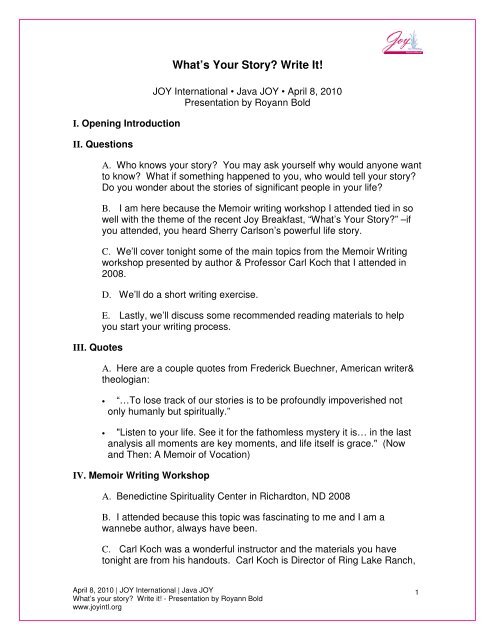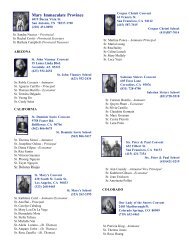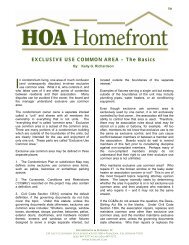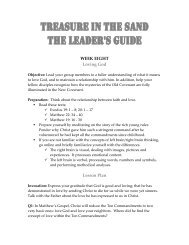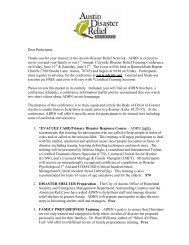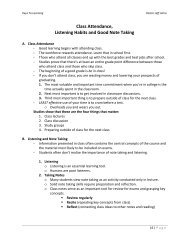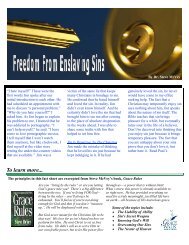What's Your Story? Write It!
What's Your Story? Write It!
What's Your Story? Write It!
Create successful ePaper yourself
Turn your PDF publications into a flip-book with our unique Google optimized e-Paper software.
I. Opening Introduction<br />
II. Questions<br />
III. Quotes<br />
What’s <strong>Your</strong> <strong>Story</strong> <strong>Write</strong> <strong>It</strong>!<br />
JOY International • Java JOY • April 8, 2010<br />
Presentation by Royann Bold<br />
A. Who knows your story You may ask yourself why would anyone want<br />
to know What if something happened to you, who would tell your story<br />
Do you wonder about the stories of significant people in your life<br />
B. I am here because the Memoir writing workshop I attended tied in so<br />
well with the theme of the recent Joy Breakfast, “What’s <strong>Your</strong> <strong>Story</strong>” –if<br />
you attended, you heard Sherry Carlson’s powerful life story.<br />
C. We’ll cover tonight some of the main topics from the Memoir Writing<br />
workshop presented by author & Professor Carl Koch that I attended in<br />
2008.<br />
D. We’ll do a short writing exercise.<br />
E. Lastly, we’ll discuss some recommended reading materials to help<br />
you start your writing process.<br />
A. Here are a couple quotes from Frederick Buechner, American writer&<br />
theologian:<br />
• “…To lose track of our stories is to be profoundly impoverished not<br />
only humanly but spiritually.”<br />
• "Listen to your life. See it for the fathomless mystery it is… in the last<br />
analysis all moments are key moments, and life itself is grace." (Now<br />
and Then: A Memoir of Vocation)<br />
IV. Memoir Writing Workshop<br />
A. Benedictine Spirituality Center in Richardton, ND 2008<br />
B. I attended because this topic was fascinating to me and I am a<br />
wannebe author, always have been.<br />
C. Carl Koch was a wonderful instructor and the materials you have<br />
tonight are from his handouts. Carl Koch is Director of Ring Lake Ranch,<br />
April 8, 2010 | JOY International | Java JOY<br />
What’s your story <strong>Write</strong> it! - Presentation by Royann Bold<br />
www.joyintl.org<br />
1
an ecumenical retreat center in the Wind River Mountains of Wyoming.<br />
For many years he served as senior editor and staff writer at Saint Mary’s<br />
Press. He has authored over 30 books and has explored his own memoir<br />
in each one.<br />
D. I have not written my memoirs yet, but I have started and will complete<br />
them.<br />
E. The session was Friday night and Saturday. We listened to Carl’s<br />
presentation and did some writing exercises and shared with those at our<br />
table and with the entire group.<br />
V. Why write your story<br />
A. Creative self-expression, like me, you may feel the need to write. <strong>It</strong><br />
can be a very rewarding process.<br />
B. Identifying what influences shaped your life such as your spiritual<br />
journey. Carl Koch offered a quote from Maya Angelou: “<strong>It</strong>’s hard to know<br />
where we’re going unless we know where we have been”.<br />
C. The search for your identity or as Carl put it, “we can never be whole,<br />
until we know who we are”.<br />
D. You may want to write to make peace with yourself, answering<br />
questions such as why do I struggle with a certain part of your life He<br />
said to us: “Know your story and all its brilliance, beauty, ugliness and<br />
fear”.<br />
VI. Autobiography vs. Memoir<br />
A. Autobiography is the story of a life.<br />
B. Memoir is the story or collection of stories FROM a life - in other words,<br />
lots of journals, diaries and letters end up becoming a memoir – your<br />
memoir can be based on key moments from your life. You can think of it<br />
as a bunch of little stories.<br />
C. One of Carl’s recommendations was to just get on with it and get<br />
started. He advised us to “get rid of the English teacher or the censor, get<br />
past your mother, start writing and go clean it up later”.<br />
D. Remember this – if you write one story a week on a piece of paper at<br />
the end of the year, you will have 52 stories. Carl recommended we<br />
establish a habit to write ½ hour each day.<br />
April 8, 2010 | JOY International | Java JOY<br />
What’s your story <strong>Write</strong> it! - Presentation by Royann Bold<br />
www.joyintl.org<br />
2
E. One suggestion he gave us was to start by doing a family blog and<br />
send it out to people to read your story. Encourage them to do the same,<br />
which would be a wonderful document when complete.<br />
VII. What are “MARKINGS”<br />
A. The first page of your stapled handout talks about Markings or the key<br />
moments of your life. This is how former UN General Secretary Dag<br />
Hammarskjöld referred to them. Markings are moments or events that<br />
come to mind when we spontaneously write about who we are right now.<br />
B. Here are some examples: an important relationship in your life – how<br />
did it start, what happened next, key conversations, all the way to the<br />
present. Markings can be done for failures or successes, romantic<br />
relationships, career events, family, etc.<br />
C. When you start this process, you start by relaxing, breathing deeply<br />
and close your eyes and let your life unfold before you like a movie. When<br />
you recall scenes, encounters, accomplishments you can start writing by<br />
putting “I remember” on a blank page and begin from there.<br />
VIII. The GENOGRAM<br />
A. On the second page of the stapled handout is the information about<br />
how to construct your genogram. A genogram is a pictorial display of a<br />
person's family relationships. <strong>It</strong> goes beyond a traditional family tree by<br />
allowing the user to visualize hereditary patterns and psychological factors<br />
that punctuate relationships.<br />
B. In Carl Koch’s presentation he refers to Peter Gilmour’s book, “The<br />
Wisdom of Memoir” which describes the genogram as assisting people in<br />
establishing and interpreting their place within their intergenerational<br />
families of origin...tracing one’s lineage can help a person understand their<br />
identity”<br />
C. Have any of you done a genealogy chart If you have, you can take<br />
that as a starting point to trace your “Bloodlines” which establish your<br />
ethnic, national, and cultural origins. Start jotting down sentences about<br />
people in your chart.<br />
D. Also, include the “Thoughtlines” of these people. We’ve all been<br />
touched and formed by an ancestry of key ideas and concepts that they<br />
have taught us. Then after you think of this, how did that idea shape my<br />
life <strong>Write</strong> about it.<br />
April 8, 2010 | JOY International | Java JOY<br />
What’s your story <strong>Write</strong> it! - Presentation by Royann Bold<br />
www.joyintl.org<br />
3
IX. Spiritlines<br />
A. Very important to your memoir would be to write about your own<br />
spiritual development. Thinking about the moments when you had<br />
meaningful spiritual experiences and how your life was different because<br />
of them.<br />
B. Do you have a sacred place Mine was our family’s farm, which was<br />
very meaningful in my relationship with my Dad.<br />
C. Also, writing about what your family member’s religious beliefs and<br />
practices were will help identify how they influenced your life.<br />
X. The last section of your stapled handout talks about Heartlines.<br />
A. This is where you define the relationships in your life that have been<br />
most formative; parents, friends, a beloved person, a mentor, an enemy.<br />
Relationships are often the GREAT story of our life.<br />
B. Define who the people are in your life that you care for and nurture; if<br />
they invited you to dinner, who would be sitting around the table<br />
C. Pick one important person and write a storyline about that relationship<br />
from your earliest memory to the present.<br />
XI. Let’s do a writing exercise: HANDOUT (Appendix)<br />
A. Pick one of the 8 questions on this page (see Appendix) and let’s take<br />
a few minutes to let you start writing. You won’t probably finish, and after<br />
we call time, we would like you to just turn to the person near you and<br />
share your writing.<br />
B. As a follow-up to our presentation tonight, we would like to ask how<br />
many of you might be interested to meet again in a setting like this to take<br />
this writing exercise, continue to work on it and meet again to share your<br />
writing with a group<br />
XII. Recommended Reading Material<br />
A. Some of the recommended reading material on memoir writing is<br />
included in your agenda. I have brought some of them with; I have<br />
personally read Markings by Dag Hammarskjöld, Dakota by Kathleen<br />
Norris, and 3 Weeks with my Brother by Nicholas Sparks. I am also<br />
reading Writing About <strong>Your</strong> Life, by William Zinsser.<br />
April 8, 2010 | JOY International | Java JOY<br />
What’s your story <strong>Write</strong> it! - Presentation by Royann Bold<br />
www.joyintl.org<br />
4
XI. Closing thoughts<br />
A. Lastly I’ll just offer to you that the thought of writing can be daunting, I<br />
know that myself. All of these reference materials are very helpful to your<br />
process.<br />
B. As Carl Koch encouraged us: Writing is an exploration; a compilation<br />
of sentences becomes paragraphs and a compilation of paragraphs<br />
becomes a story...think of your life as a bunch of little stories...just get on<br />
with it and get started!<br />
April 8, 2010 | JOY International | Java JOY<br />
What’s your story <strong>Write</strong> it! - Presentation by Royann Bold<br />
www.joyintl.org<br />
5
Appendix<br />
Writing Exercise<br />
Answer the following questions:<br />
1. What was the happiest time in your life<br />
2. What was the saddest time in your life<br />
3. What is your favorite holiday<br />
4. What is your favorite place<br />
5. Who was the most influential person in your life<br />
6. What is your favorite book<br />
7. What do you consider your biggest success<br />
8. What incident or person was the most influential in your spiritual journey<br />
April 8, 2010 | JOY International | Java JOY<br />
What’s your story <strong>Write</strong> it! - Presentation by Royann Bold<br />
www.joyintl.org<br />
6


